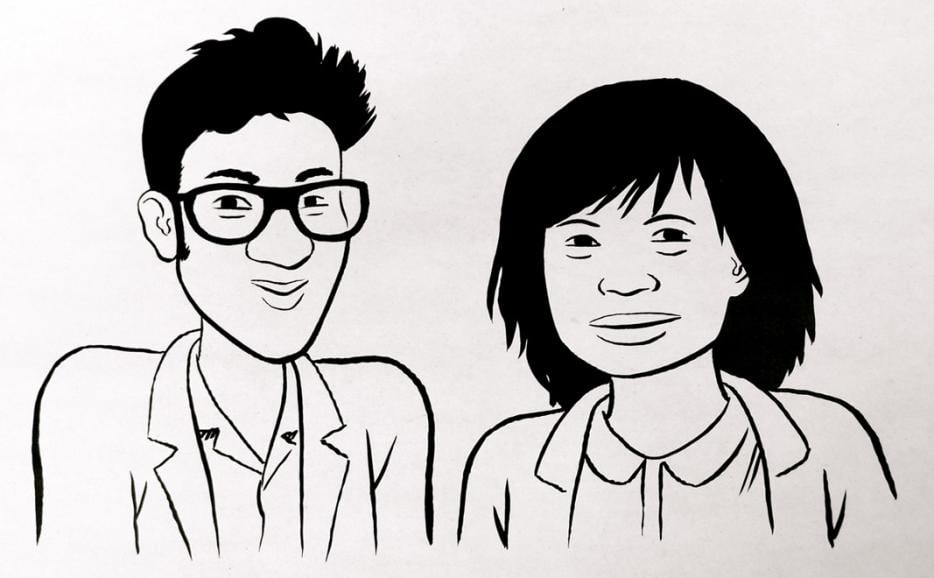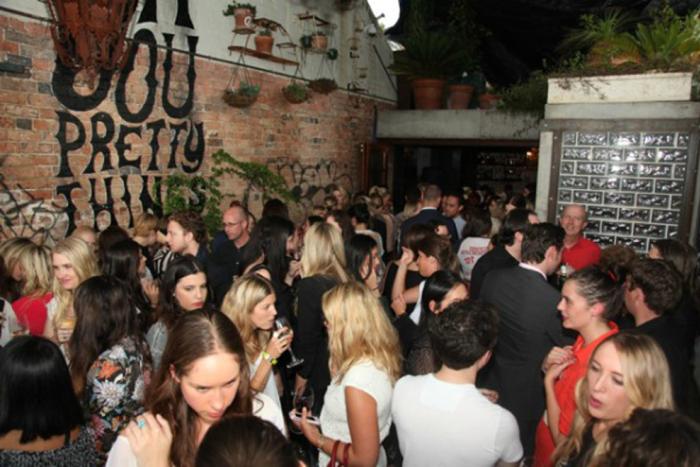Every week or so, Sook-Yin Lee and Adam Litovitz have a movie date. Then they talk about the movie. Discussed this week: Holy Motors, directed by Leos Carax.
SOOK-YIN: Our third movie date. The first two were entertainment blockbusters, and this one falls squarely in the art house.
ADAM: The art house has presented us with two movies this year involving anxious men riding limousines. In both movies someone has to perform a variety of delineated activities throughout a day. Midnight ends this fairytale.
SOOK-YIN: You’re talking about David Cronenberg’s Cosmopolis and this one is Leos Carax’s Holy Motors.
ADAM: A title which immediately evokes both the spiritual dimension and the technological, collapsing them. Where does the human begin and the machine end?
SOOK-YIN: Shared anxieties. Carl Jung would have a field day with this: why are we doing movies in stretch limos about very difficult situations?
ADAM: The interesting thing about dealing with such a non-narrative movie is not knowing where to begin.
SOOK-YIN: It has a crazy poetic logic I had to surrender to. The movie begins from the point of view of a screen in a cinema with an audience staring at the film, then it dovetails into a man in his hotel room, and his middle finger morphs into a screwdriver which opens a secret door in the wall that he crashes through, and he’s walking out of a building with his children playing on the rooftop. From that moment I was like, “okay, we’re in for a strange ride.” I had to give up on right-brained thinking and succumb to a dream-logic, which had a lot of interesting twists and turns.
ADAM: The weirdness was front-loaded, like on a pop album. The first few scenes were intensely weird, but once you settle into a groove it isn’t quite as shocking: the blood doesn’t spray as unexpectedly.
SOOK-YIN: I expected a crazy movie that changes my physiology like Enter the Void, where we sat in the front row and were so addled that we couldn’t speak afterwards. We all tried going for dinner and it was very awkward. I think you’re right—Leos Carax is a total pop enthusiast. Holy Motors was bright, fun, and absurd, like Mr. Toad’s Wild Ride. It stars one of my favourite actors, Denis Lavant. He’s dangerous and loveable, like a boxer with a broken nose. The first time I saw him was in Claire Denis’s Beau travail. There’s an incredible scene where he loses his nut dancing. He’s got a sinewy, muscular body, ferocious face, and explosive presence. In the music video for UNKLE’s “Rabbit in Your Headlights” he also plays an unhinged, crazy man.
ADAM: Like Enter the Void [directed by Gaspar Noé], we’re dealing with a movie made by a provocateur and experienced shock artist. The French are no strangers to the marriage of shocks and existential dread.
SOOK-YIN: It’s also very clown-y.
ADAM: Even the gravestones are advertising space for internet sites. It’s constantly ribbing contemporary society.
SOOK-YIN: And, what the heck is it? Denis Lavant plays Oscar, the man at the back of a limo with an interesting chauffeur, a super-sexy octogenarian [played by Georges Franju muse Edith Scob]. We rarely see sexy octogenarians in bell-bottom pants and good suits with great hair. She drives him to appointments where he transforms into different people, throwing himself into the strangest circumstances. He’s a sort of thespian with a makeup mirror and a tickle-trunk full of costumes. Like a secret agent, he finishes his missions only to be dropped off at an equally absurd place, playing yet another character. It’s Beckettian. Is this heaven or hell? Is this earth?
ADAM: He’s impervious to death. He gets stabbed in the neck and shot various times. Though, there’s a sense that there are still mortal stakes. People die.
SOOK-YIN: They only live if they return to the limousine. It’s the embryonic fluid. If you don’t make it back to the womb you’re a goner.
ADAM: One of Oscar’s characters is a green-suited, Billy Goat-bearded monster who viciously attacks a spaced-out supermodel played by Eva Mendes, dragging her into a sewer. He eats anything: her clothing, flowers, fingers. But, at the same time, he beautifully restyles her, taking her western garb and turning it into something approximating a burka. He’s both on the fringe of being socially capable and ingeniously couture.
SOOK-YIN: One of Oscar’s other appointments was as a sort of scuba diver with little light bulbs all over his body. He’s directed through a glow-in-the-dark dance number in a strange lair. There’s an incredible moment where another video game-style character appears, a very tall, large-breasted woman, in a red latex onesie. They make love, entwined in each other’s bodies. The image of Denis Lavant’s tongue on her latex crotch was very striking.
ADAM: The limo driver wears an all-blue uniform, and the leprechaun is in a green suit. It’s a motif. People wear monochromatic outfits as if to suggest that we’re inevitably in uniforms. It’s part of the Judith Butler performance theory 101 running through the movie. Not only is gender a performance, but existence itself is a series of fragmented performances, all of which just amount to a day that we’ve arbitrarily structured.
SOOK-YIN: That’s key to this movie. It’s fun and frivolous going through various hilarious appointments with Oscar, but at the end of each one, he’s an actor at the back of a limo, which gets to be sad and rootless. I acted in the Jack Layton biopic this summer as Olivia Chow, which was discombobulating. I transformed into her and became confused about who I was. It’s taken three months to reconfigure a new identity, and I can’t say that I’m the same person I was before. Oscar embodies the dilemma of the actor who must sacrifice their consistency of being to experience an exciting array of characters, but winds up without home or grounding. The film constantly revisits notions of obsolescence and extinction. His big boss and audience turn on him, suggesting he’s not as good an actor as he once was. There’s a conversation about how cameras are getting smaller and smaller, and soon we won’t need them, just as actors become obsolete when they stop being virile and youthful and sexy.
ADAM: The movie is filled with metatheatricality and metacinema. Holy Motors begins with clips of some of the first moving images, and later the movie plays with flicker effects and hallucinatory filters, like Enter the Void and other recent French cinema influenced by video art. Technology becomes obsolete: even the limos are filled with existential dread. The chauffeur tells Oscar to look out his window at beautiful Paris, and all he gets to look at is a green-tinted infrared screen. It’s like the moment in Jacques Tati’s Playtime when you only get to see the Eiffel Tower as reflected in a modernist building.
SOOK-YIN: Holy Motors embraced iconic cinema tropes, like the spontaneous musical number with Kylie Minogue, or an intermission for a euphoric accordion ensemble’s performance. Leos Carax is wondering where is the future of cinema, with an aging and obsolete actor in the back of the limo.
ADAM: Thankfully, he can always take even the most conventional type of sequence and add touches that are novel and exciting. We’re used to a musical interlude, but this intermission involves accordion, electric guitar, and breakbeats. Even the count-in is unconventional, with bandleader Oscar shouting “trois, douze, merde!” [“three, twelve, shit!”] instead of numbers in order.
SOOK-YIN: It’s completely absurdist. But, there’s enough philosophically so it’s not: “what the fuck?” Is Oscar the protagonist or antagonist? In one appointment he resides in an idyllic, happy home with his chimp wife and chimp children. He’s the father figure looking wistfully out a window, saying “new things are coming our way.” Carax seems to be implying that most of our lives are routine. We don’t have an array of exciting characters to embody like Oscar does. We wish for difference. So, it’s curious seeing Oscar looking out the window and wishing for the Canadian dream of a new, exciting future. It’s a nice tension between the wish for transformation and the tragedy of constantly transforming.
ADAM: Are we expected to be complacent with that regimented situation, or like Carax are we expected to have an anarchic, irreverent, misanthropic relationship to it?
SOOK-YIN: I don’t think he’s suggesting either/or. He’s suggesting that it’s our essential human conundrum. Despite how repetitive and dull life may seem, we are constantly transforming, we can’t escape it. Similarly, the movie bustles along at break neck speed with music video aesthetics, borrowing from the language of Michel Gondry and Jonathan Glazer.
ADAM: Also, it shares David Lynch’s axe to grind with the entertainment industry, like the scene with the latex figures against a green screen.
SOOK-YIN: For me, that glow-in-the-dark dance sequence was a swipe from a Daft Punk music video.
ADAM: Or, Tron, which Daft Punk did the soundtrack for. I mean, it was people on a grid.
SOOK-YIN: It’s candy-coated pop imagery, with a Sparks song blaring in a car with Oscar on an appointment as a bad dad.
ADAM: And slow-motion martial arts by people who just impersonated crippled hunchbacks.
SOOK-YIN: We’re seduced by exciting images that keep you watching, and the mystery engages us to figure it out. Is he in Bardo, an after-death world? Oscar runs into a woman played by Kylie Minogue who was once his lover, or something. After their limos collide, they steal away into an abandoned building called the Samaritan Hotel—is this heaven, or a level of Dante’s Inferno?
ADAM: The Samaritan Hotel used to be where the Kylie Minogue character bought bras. Just as the characters are capable of infinite transformations, buildings go through profound rebirths and cyclical histories.
SOOK-YIN: Even though our workaday world seems inert, it’s always a different world, full of micro-changes.
ADAM: It’s not a far cry from the Baudelairian motif of a “man in the crowd” constantly penetrated by shocks, forced to perform and receiving nothing but traumas with which to deal.
SOOK-YIN: Exactly. I’ve fallen in love so many times in my life and each time could be a movie unto itself, but I’m the same person. Denis Lavant’s transformations are extreme, but we make imperceptible transformations that are equally or more dramatic.
ADAM: There are so many jarring juxtapositions. Oscar goes from being a homeless beggar to a technological wizard who can have the most fantastic sex and martial arts experience.
SOOK-YIN: To an angry dad, mad at his daughter for not being more popular.
ADAM: And he punishes her by telling her that she has to be herself. His form of chastising is filling her with traditional French existential dread.
SOOK-YIN: On one level, there are so many dazzling inversions. On another level, there’s a mundane reality, opposite aesthetically, that Carax feels is as important and strong a pulse in our lives.
ADAM: Yet, does either really amount to anything? Is there an optimism here?
SOOK-YIN: I don’t know. I feel like at the end it’s just like “meh, oh well.”
Illustration by Chester Brown






